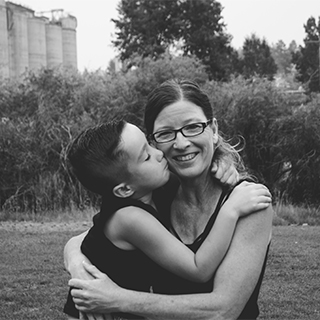MONTANA VOICES AMPLIFIED: My Perspective: How to Help When You Don’t Know How to Help

By Elizabeth Hill
Elizabeth Hill is a freelance writer, encourager, and humorist who resides with her husband and four children in central Montana. You can read more of her musings, eureka moments, and the hilarious events that mark her days with joy at elizabeth-hill.medium.com or find The Part I Love on Facebook.
Our journey with our daughter has been one filled with joy. Her vibrant personality draws people, and her genetic diagnosis has forged countless connections with people we would never have met otherwise. On the flip side, we’ve experienced rough patches; none more difficult than the uncertainty we’re living with right now.
Our daughter is receiving hospice care. Being on the receiving end of the concern of so many has given me new perspective on the kindness of others. How can friends and family best support those in a situation like ours? Allow me to share a few tips for supporting those who are struggling.
Many times when people are struggling, others don’t know how to help. So they do nothing or say my least favorite words, "Let me know what I can do."
The problem with this phrase is that it puts the burden on the person who is ALREADY BURDENED and feeling decision fatigue. We don't know what we need. OR we’re uncertain about what the person has in mind--a meal? Massage? Private jet?
I made this graphic a few years ago to “help people help.”

- Ask yourself, What can I give? Money? Food? A text? A ride? All are equally honorable. There is no wrong answer unless you want to give unsolicited medical/life/parenting advice without being asked.
- Ascertain what would be helpful if you were in their situation.
From my personal experience with both giving and receiving, the best approach is this: "I can bring dinner by this Wednesday or Thursday. Would that be helpful?" Or " I can come by Friday and help clean. Would that work for you?" You decide what you can offer in a specific way, allowing opportunity to accept or decline without guilt.
It might be helpful to see a list of the ways people have served us in the past few months. Some required money, many didn't. Some required a sacrifice of time, many didn't. Each was appreciated.
- Check-ins via text, calls, emails, IG/FB messenger, or mail
- In-person visits
- Respite care (learning how to care for my daughter and being with her so I can do other things)
- Sharing funny gifs, YouTube videos, or social media accounts my daughter might enjoy
- Making funny videos
- Purchasing an audible subscription
- Gifts such as: blankets, comfy socks, nail polish, whoopie pies from Maine, t-shirts, gift cards, muffins, ice cream, and books
- Dropping off frozen or hot dinners
- Gift cards to restaurants
- Taking the old bananas rotting on my counter and bringing back banana bread
- Picking up grocery items or prescriptions
- Visiting and bringing small gifts when we are in the hospital
- Allowing us to use vacation homes for medical appointment housing
- Helping with rides for our other kids
- Connecting us to local people during out-of-town (or out-of-state) hospitalizations
- Taking time to stay up-to-date with information we provide in the way we provide it (currently the CaringBridge website) so we don't have to repeat information
- Giving sound medical advice when asked
- Listening and offering advice when asked
- Praying for us
Know there really is no wrong way to send love as long as you don't give unsolicited advice or ask intrusive questions. Honestly, the worst thing anyone can do is, do nothing.
I know that it's uncomfortable talking and listening about hard things, like death–especially the death of a child. If you feel uncomfortable, lean in anyway. You can even say, "I don't know what to say. I'm here for you."
If you feel moved to reach out, reach out. If you want to send a note, do it. If you want to visit but don't know what you’ll say, visit anyway. I promise, we're still the same people we’ve always been. We’re still us.
For another perspective, Elizabeth recommends: Silk, S., & Goldman, B. (2013, April 7). How Not to Say the Wrong Thing. Los Angeles Times. https://lat.ms/2XkTVjK
Disclaimer:
This publication was developed under Grant H84MC32752 from the Health Resources and Services Administration (HRSA), Family to Family Health Information Center, $96,750. Views and opinions expressed in this article are the author’s and do not necessarily reflect the official policy or position of the Montana Family to Family Health Information Center, the Rural Institute for Inclusive Communities, the University of Montana, or HRSA.
Montana Voices Amplified:
The Montana Voices Amplified project offers people of all ages and abilities a stage to speak for themselves. The series is hosted by the Montana Family to Family Health Information Center (MT F2F), a program of the Rural Institute for Inclusive Communities (RIIC) at the University of Montana.
Montana Voices Amplified provides a microphone and broad audience so the stories, lessons, causes, and advice of individuals with disabilities and their families are heard.
Montana Voices Amplified welcomes submissions of five-minute videos or 600-700-word essays on any topic related to your lived experience as a person with a disability or caring for someone with a disability.
Authors of chosen submissions receive $100. Videos will be posted on the MT F2F website and shared on social media. Essays will be posted on the website and ScholarWorks, shared on social media, and printed in a professionally designed publication to distribute to families, schools, agencies, and legislators as appropriate.
Let us amplify YOUR voice!
Send your idea for an article or brief video to shawna.hanson@mso.umt.edu.
If you prefer to talk through your idea, you can call Shawna at (406) 243-4531.

